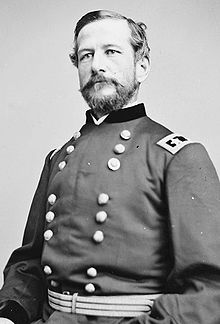Alfred Pleasonton
Alfred Pleasonton was a United States Army officer and major general of volunteers in the Union cavalry during the American Civil War. He commanded the Cavalry Corps of the Army of the Potomac during the Gettysburg Campaign, including the largest predominantly cavalry battle of the war, Brandy Station. In 1864, he was transferred to the TransMississippi Theater, where he defeated Confederate General Sterling Price in two key battles, effectively ending the war in Missouri. He was the son of Stephen Pleasonton and younger brother of Augustus Pleasonton.
Pleasonton was born in Washington, D.C. on July 7, 1824. He was the son of Stephen and Mary Hopkins Pleasonton. Stephen was well known at the time of Alfreds birth. During the War of 1812, as a U.S. State Department employee, Stephens personal initiative saved crucial documents in the National Archives from destruction by the British invaders of Washington, including the original Declaration of Independence and the U.S. Constitution. As Fifth Auditor of the U.S. Treasury, Stephen Pleasonton was de facto superintendent of lighthouses of the United States from 1820 to 1852. His conservative approach and emphasis on economy held back advancements in lighthouse construction and technology and led to deterioration of some lighthouses. Since he had no technical knowledge of the field, he delegated many responsibilities to local customs inspectors. In 1852, the U.S. Congress decided reform was needed and established the Lighthouse Board to take over fiscal and administrative duties for U.S. l
Source: Wikipedia

